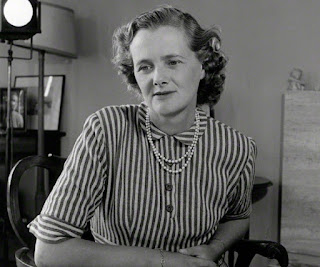Rebecca by
Daphne du Marier
It was not until I started doing
a bit of research to give details of this month’s play that I discovered that Rebecca is
a 1938 Gothic novel. The novel depicts an unnamed young woman who
impetuously marries a wealthy widower, before discovering that both he and his
household are haunted by the memory of his late first wife, the title
character.
Rebecca is a bestseller which has never gone out of
print, and has been adapted numerous times for stage and screen (both film
and TV), including a 1939 play by du Maurier herself. The 1940 directed by Alfred Hitchcock won
the Academy Award for Best Picture, and in 2020 there was a remake for Netflix. The original novel has been translated into
many and diverse languages.
It has been suggested that the
novel drew inspiration from Jane Eyre, and Daphne du Maurier admitted
that the theme of jealousy was drawn from her own experience of having a husband
who had been engaged before to a glamorous woman.
The novel is remembered especially for
Mrs. Danvers, the West Country estate Manderley, and its opening line:
"Last night I dreamt I went to Manderley again."
Characters
|
Maxim de Winter |
Owner of Mandalay |
|
Mrs de Winter |
His new bride |
|
Frith |
Butler |
|
Mrs Danvers |
Housekeeper |
|
Beatrice Lacy |
Maxim’s sister |
|
Giles Lacy |
Her Husband |
|
Frank Crawley |
Estate Manager |
|
Jack Favell |
Friend of Mrs Danvers |
|
Colonel Julyan |
Chief Constable |
Daphne du Maurier 1907-1989
Although she married Frederick Browning, she continued to write in her maiden name. She became Daphne du Maurier, Lady Browning when she was elevated to the Dame Commander of the British Empire in 1969, but she never used the title. According to her biographer Margaret Forster, she told no one about the honour, so that even her children learned of it only from the newspapers. "She thought of pleading illness for the investiture, until her children insisted it would be a great day for the older grandchildren. So she went through with it, though she slipped out quietly afterwards to avoid the attention of the press."
